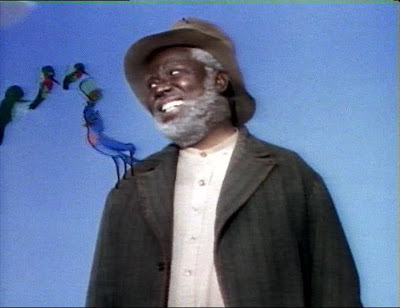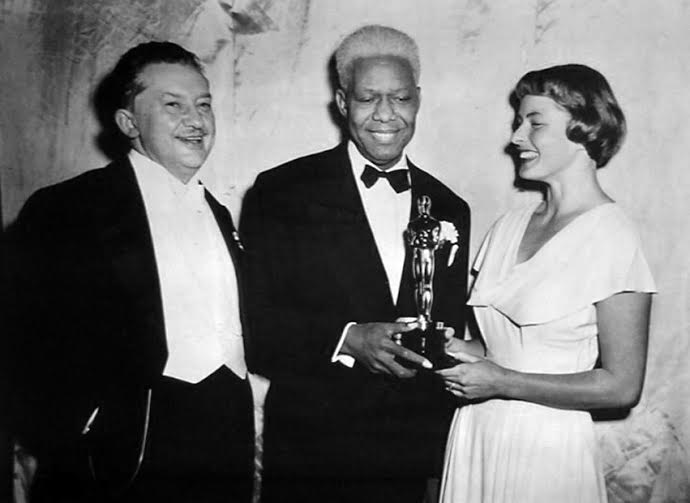Black History Month: Song of the South's Forgotten Oscar
 Wednesday, February 11, 2015 at 5:31PM
Wednesday, February 11, 2015 at 5:31PM  Tim here to kick off a daily miniseries for the team. It might seem disingenuous, if not outright perverse, to begin The Film Experience's rough chronological celebration of Black History Month by taking at peek at one of the most infamously racist movies ever made, but for good or bad, Song of the South (1946) is an important milestone in the all-too-thin history of African-Americans and the Oscars. Seven years after Hattie McDaniel's groundbreaking Best Supporting Actress win for Gone with the Wind (we recently dove deep into that film else we'd start with her) James Baskett became the very first black man to receive an Academy Award, and the last for 16 years.
Tim here to kick off a daily miniseries for the team. It might seem disingenuous, if not outright perverse, to begin The Film Experience's rough chronological celebration of Black History Month by taking at peek at one of the most infamously racist movies ever made, but for good or bad, Song of the South (1946) is an important milestone in the all-too-thin history of African-Americans and the Oscars. Seven years after Hattie McDaniel's groundbreaking Best Supporting Actress win for Gone with the Wind (we recently dove deep into that film else we'd start with her) James Baskett became the very first black man to receive an Academy Award, and the last for 16 years.
Not, mind you, a competitive Academy Award. Baskett was the last adult actor to receive an Honorary Oscar for a single performance (rather than for a career), with the inscription:
For his able and heart-warming characterization of Uncle Remus, friend and story teller to the children of the world, in Walt Disney's Song of the South".
[More...]
 Baskett receives his Honorary from none other than Ingrid Bergman!
Baskett receives his Honorary from none other than Ingrid Bergman!
The possibility of Baskett cracking the 1947 Best Actor race (the film, though released in December 1946, somehow competed in the '47 Oscars instead) isn't one that seems to have been considered or hoped-for by anyone, not even Disney himself, who personally campaigned with Academy President Jean Hersholt for the ailing Baskett to receive an award on the grounds that he had created the character almost totally without direction. When we are in the position that Walt Disney hustling for Song of the South is an act of progressivism, we are truly staring down the gun barrel of institutional racism.
Whatever forced the Academy into its half-measure effort in recognizing him, the fact remains that Baskett (who died just months after receiving the award, at age 44) was quite wonderful in the role of Uncle Remus, former slave, current sharecropper, and friend of talking cartoon animals. Indeed, without getting into the questions of whether Song of the South is profoundly racist (it is) and as a result deserves to be banned by its parent company (it does not), Baskett's performance is one of the handful of things that's incontestably worth saving from the film.
It's important to remember context: in 1946, when the film was new, an African-American in a leading role of this kind in a white-production had almost never happened. He's not the protagonist – he fills precisely the same narrative function that Mary Poppins does in her own movie – but Remus is fully rounded and given a range of emotions and thoughts that set him apart from virtually every other minority character in mainstream Hollywood films of that generation. Some of that has to do with the simple fact that he's not called upon to be the high-strung, squealing comic relief, like 95% of the black men in movies of the '40s. Most of it is simply because Baskett doesn't play the character like a stock type, even if the screenplay otherwise feels littered with stock types, regardless of race. There is warmth, insight, charisma, and most importantly, a clear thread of self-respect and dignity running through Baskett's performance of a role that could easily be a cringe-inducing collection of paternalistic white notions of post-war Southern black life.

Insofar as the live-action portions of Song of the South aren't totally objectionable (the three animated sequences – including Baskett's superb work voicing the villainous Br'er Fox – is infinitely less odious, which is why it's easier to find), Baskett's calming, rich, and very human presence is the primary reason why. It would be far too much to argue that he redeems the film from its unconsciously racist tendencies; he does, however, humanize them. To view it in 2015, it's easy to see all the stereotypes and Uncle Tom-isms, and the general sense of pandering underlying it all, but this was, for good or ill, the first truly strong black male lead performance in mainstream American movies. It is wonderful that it has been improved upon so much, so many times in the generations since, but it's important to still recognize and appreciate Baskett's work for what he accomplished in his own time.



Reader Comments (10)
Tim,
It IS racist but you are so correct in your evaluation, particularly when you compare this performance to Eddie Robinson or other black actors in Cabin in the Sky; Green Pastures and a host of others. Even Paul Robeson’s moving performance as Joe, singing in Show Boat, has some caricature later in the film.
Cabin in the Sky and other movies were often NOT distributed in the South. Do you know the history of this one?
Disney always acted in self interest, and the crows in Dumbo are equally horrid. I did not know about but am very glad for this special Oscar for a special performance.
I don't know much about its overall distribution, but it premiered in Atlanta, so I have to assume it was more or less seen as okay in the South. The main character is a little white boy, after all.
As you say, Disney was all about self-interest, and I don't think he'd have actively pursued making a movie that couldn't play throughout a huge portion of the United States.
I loved reading this. It's so weird that this honorary Oscar is so hidden now. I've never heard anyone mention it. And i dont think it does the world any good to pretend like certain times and things didn't happen. Disney should stop hiding this movie. It is what it is. we have to acknowledge the past and come to grips with it. Ignorance about the past certainly never helped us not repeat mistakes
Because of digital piracy everyone has access to everything that ever made its way unto a home video format. Are you resentful that you cannot purchase Song of the South from your local Blu-ray / DVD supplier? Tough titty. Song of the South lives on through the Splash Mountain ride at Disney theme parks.
3rtful -- this is simply not true. There are plenty of movies that are impossible to find. Why are you always trying to provoke? Please dont act like piracy is something we should be happy about.
I never even realized he won an honorary Oscar for this. You never hear anyone talking about it.
When I was in grade school, we did a Disney themed musical and Zip-a-dee-do-da was one of the songs we sang. We got to watch every movie from our musical from afterwards except that one, and at the time I didn't understand why. It was amusing nonetheless when I finally figured it out.
I had always heard that the reason he was given an Honorary Oscar was to prevent him from being nominated. The last thing the Studios wanted at the time was an African-American to win Best Actor and if they gave him an Honorary Oscar then members would be less likely to nominate him. It was the same reason they gave one to Laurence Olivier for "Henry V" (they didn't want a British film winning Best Picture), Harold Russell (they didn't want a non-actor to win but that one backfired) and all the juvenile Oscars. Eventually when the Studios couldn't control the Awards the way they wanted, they pulled their support from the Academy.
Fascinating read.
As difficult as it is for many to acknowledge, stereotypes often accurately portray many members of a particular group. Do you want to act like people who spoke like Uncle Remus never existed? I remember watching “Song of the South” back in the ‘70s and being charmed by Uncle Remus and the rest of this fine film. It’s a shame that so many want to hide a past that wasn’t as they now wish it had been. All the ghosts of the Uncle Remuses and Uncle Toms (an admirable man, as you would know if you ever read “Uncle Tom’s Cabin”) are not happy that you have such contempt for them.
Please excuse me for getting to this party a little late. Apparently everyone read this in the same week.
My dirty little secret. Unlike all of you, I AM black.
Foxit PDF Editor provides mutaz a full featured platform to create, manage, convert, OCR, eSign and edit PDF documents. Download the best PDF editor for free now!